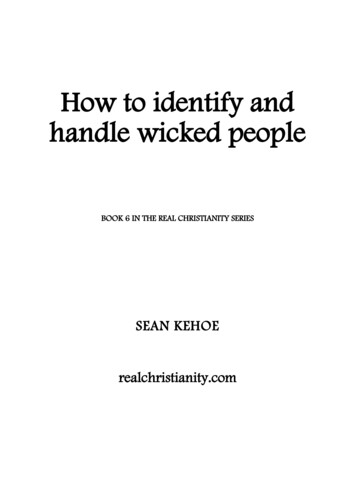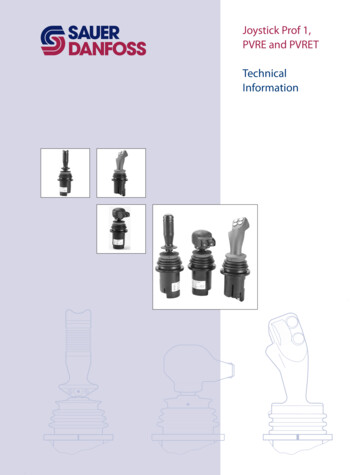
Transcription
How to identify andhandle wicked peopleBOOK 6 IN THE REAL CHRISTIANITY SERIESSEAN KEHOErealchristianity.com
PUBLISHING DETAILS AND ACKNOWLEDGEMENTS TO BIBLEPUBLISHERS Sean Kehoe 2016Published 2016How to identify and handle wicked people – Book 6 in the Real Christianity seriesSean Kehoe has asserted his right under the Copyright, Designs and Patents Act 1988 to be identifiedas the author of this work.Published by realchristianity.com of Box Number 5262, 6 Slington House, Rankine Road,Basingstoke, RG24 8PH, United KingdomISBN 978-1-910968-05-5Scripture quotations in this book are from a variety of translations. The Bible version used isindicated by the relevant initials at the end of each reference, as follows and the followingacknowledgements are made to each of the publishers:NIV New International VersionScripture quotations taken from The Holy Bible, New International Version (Anglicised Edition) Copyright 1979, 1984,2011 by Biblica (formerly International Bible Society). Used by permission of Hodder & Stoughton Publishers, an HachetteUK company. All rights reserved. “NIV” is a registered trademark of Biblica – UK trademark number 1448790.KJV King James VersionThe rights in the Authorised (King James) version of the Bible are vested in the CrownRSV Revised Standard VersionRevised Standard Version of the Bible, copyright 1952 [2nd edition 1971] by the Division of Christian Education of thenational Council of the Churches of Christ in the United States of America. Used by permission. All rights reserved.NKJV New King James VersionScripture taken from the New King James Version.Copyright 1982 by Thomas Nelson, Inc. Used by permission. All rights reserved.ASV American Standard Version Copyright, 1901, by Thomas Nelson & Sons.Copyright, 1929, by International Council of Religious EducationNASB New American Standard BibleScriptures taken from the NEW AMERICAN STANDARD BIBLE, 1960, 1962, 1963, 1968, 1971, 1972, 1973, 1975,1977 by the Lockman Foundation. Used by permission.ESV English Standard VersionScripture quotations are from the Holy Bible, English Standard Version (ESV ), copyright 2001 by Crossway. Usedby permission. All rights reserved.Image iStockphotoCover design by Kev Jones (kevdesign@me.com)www.realchristianity.com
DEDICATIONThis book is dedicated to all of the many wicked people whom God has brought into my life over theyears. Without having the chance to see their malice, craftiness and deceitful scheming at closequarters I would never have been able to learn as much as I did about their ways and methods. Thisbook is, in large part, the product of what I have had to endure at the hands of wicked bosses,colleagues and employees but also wicked members of churches, and even wicked church leaders.Each of these groups contained individuals who were, in various ways, false, manipulative, selfserving, malicious and devious. I did not enjoy any of my experiences with them at the time, but thelessons learned from each of them have stayed with me. Therefore I am now grateful to God forbringing all those wicked people into my life, though I cannot claim to have appreciated it at the time.i
HOW TO IDENTIFY AND HANDLE WICKED PEOPLEBOOK 6 IN THE REAL CHRISTIANITY SERIESCONTENTSPageIntroductionivChapter 1Some introductory points about the ‘wicked’ and how we should definethe word1Chapter 2Some further general points about the wicked and how numerous theyare14Chapter 3The damage that deception can cause28Chapter 4Identifying the wicked, part one - some of their traits and methods43Chapter 5Identifying the wicked, part two - more of their traits and methods64Chapter 6Recognise how capable the wicked are of influencing you and try hard toavoid them83Chapter 7Handling the wicked in your workplace or business - part one97Chapter 8Handling the wicked in your workplace or business - part two112Chapter 9Dealing with deception and deceivers - part one130Chapter 10Dealing with deception and deceivers - part two144Chapter 11Come to terms with the fact that there are many wicked people insidechurches and start to see the significance of that156Chapter 12Some examples of wicked Christians from my own experience174Chapter 13Some examples from the Bible of wicked believers who were false anddid great harm186Chapter 14Handling the wicked in the context of a church - part one196Chapter 15Handling the wicked in the context of a church - part two207Chapter 16Dealing with wicked church leaders - some introductory points218ii
Chapter 17The wickedness of ‘hirelings’ and of cowardly leaders who leave thecontroversial parts of the Bible out of their teaching227Chapter 18The wickedness of ‘Nicolaitanism’ - where church leaders are abusive,controlling, manipulative or domineering240Chapter 19Some of my own personal experiences of Nicolaitan leaders who ruledover their churches254Chapter 20How to decide whether to leave a church or to stay and fight to change it267Chapter 21How to conduct yourself properly, and safely, when tackling the wicked,and the importance of seeking God’s help276Chapter 22Our duty to resist the wicked293Chapter 23Some further advice on dealing with the wicked, whether in churches orin the world312Chapter 24The vital need for resolve and courage to press on, especially when youare up against witchcraft318Chapter 25How far can we go in resisting the wicked? Can we even use force?342Chapter 26Praying against the wicked - a brief introduction to ‘imprecatory’ prayer359Chapter 27Dealing with witchcraft and curses - a brief introduction to two very bigsubjects394iii
INTRODUCTIONThe wicked plots against the righteousand gnashes his teeth at him,Psalm 37:12 (ESV)I have never seen any book which deals with how to identify and handle the wicked, or even what itmeans to be wicked. Twenty years ago I wouldn’t have believed it possible if someone had told me Iwould one day write a book on this subject. At that time I knew very little about the wicked and, inparticular, had no idea that they were so numerous. Above all, I never imagined that so many were tobe found inside churches. When I started out as a Christian I was even more naïve, or ‘simple’, as theBible puts it. I often failed even to recognise the wicked, let alone know how best to handle them.But, over many years, God put me through a rigorous training programme whereby He brought intomy life far more than my fair share of wicked people. I met some of them when I was a police officerfor three years in the mid-1980s. My experiences in that job began to open my eyes to the realities ofthis world and how the wicked operate. However, that was only the start and I actually met far moreof them in the years after I left the police, in workplaces and amongst those whom I acted for, andagainst, in my career as a lawyer.However, I have probably encountered more wickedness within churches than outside of them,including many wicked church leaders. Their worldliness, dishonesty and manipulation wasshocking. What was hardest to come to terms with was how brazen and unrepentant the wicked are,even inside churches. They seem to have no fear of God and no expectation of having to meet JesusChrist face to face on the Day of Judgment and give an account. Somehow, they are unconcernedabout this and they do as they please, without any apparent regard for how God sees their actions.For some years I could not really believe what I was seeing or hearing when I discovered things thewicked had done. I kept telling myself that I must be imagining it, or exaggerating. But I wasn’t.Most of the time I was actually under-estimating the true scale of the problem. Indeed, I probably stillam, despite writing this book. Yet, as my eyes gradually opened, I saw that people’s capacity forwickedness, even within churches, was far worse than I had suspected. God also exposed me tocountless other learning experiences within my law firm, which I wholly owned, and also in previouslaw firms, where I was either an employee or a partner.In this book I set out some of the situations I faced and the various people I had to handle. The factsare all true, although names have been altered for the sake of those concerned - even the wickedest ofthem. I still pray for these people, and even feel that I owe them a debt, in a certain sense. Withouttheir evil schemes I would never have had the learning opportunities which led to this book. I havewritten it for the sake of those who are still as naïve and unsuspecting as I once was. How I wishsomeone had put this book into my hands 20 years ago, or even 10 years ago.It would have prevented many misjudgements and saved me from a lot of the devious tricks that I fellfor. It would also have helped to open my eyes much faster than they did open during those years.But there was no such book. Or, if it existed, I never saw it. I cannot claim that this book will solveevery problem and identify every deceiver and manipulator in your life. The wicked people that youmeet will each have their own features. However, the general principles and advice set out in thisbook will shift the odds in your favour. Then, at the very least, you won’t be as naïve andundiscerning as I was in my early encounters with the wicked.Another of my objectives for this book is to seek to persuade you that the wicked are vastly morenumerous, and have much more influence over your life, than you probably believe at present. Toomany of us go through life largely unaware of the impact that the wicked have. In particular, we donot realise, or are not willing to accept, that the wicked are to be found in churches, as members andeven as leaders. The unbiblical structure of traditional, hierarchical churches deepens the problem.iv
Many are led by ‘clergymen’ who are building careers, and even empires, for themselves. Alsounhealthy man-made traditions are followed, rather than what the Bible says.The net effect of all this is that it is probably within the leadership of churches that the highestproportion of wicked Christians are to be found, rather than amongst the ordinary members. Thetraditional manmade model of church structure means that wolves and hirelings are not preventedfrom getting to the top, as they should be. On the contrary, their advancement is made even easierbecause the absence of biblical safeguards leaves the way wide open for them. Such carnal, clergyminded men believe they are above God’s people and feel entitled to rule over their churches.They act in an authoritarian and controlling manner, rather than as the gentle servants and shepherdsthat church leaders are meant to be. Please see Book 8 in this series for a fuller discussion of theproblems caused by unbiblical church structures and practices. However, I will give examples in thisbook of some of the wicked church leaders I have dealt with and explain the methods they used touse, exploit, dominate, manipulate, control and deceive people. Such men are very highly skilled inthe art of deception, especially with anybody they perceive as a threat.As your discernment begins to grow those techniques will be used against you because, if your eyesare starting to open, the wicked will immediately notice. You will be seen as a threat and they willtake steps to silence you and marginalise you. They feel entitled to do whatever is needed to defendthemselves and their own interests. So, they react in the flesh and lash out, without any thought as towhat God may think of their behaviour. They can easily persuade themselves that any reaction ortactic is justified if it is in response to a perceived threat to their own position.However, the truth is that many of our reactions aren’t justified. We are always required to act, andreact, in a godly way, even when we feel threatened. Indeed, it is precisely at such times that we mostneed to control ourselves and to do what is right, not what is expedient. That is how we Christians aresupposed to operate, but it is not how most of us actually behave, even in churches. We thereforeneed to be realistic and wary about that, yet without being afraid of the wicked. We must not beintimidated into silence, or inactivity, when we should be making decisions and taking firm action.Likewise, we have a duty to avoid being naïve, such that the wicked walk all over us, because wecan’t believe that anyone could be wicked enough to do the things they do. Under-reaction, or nonreaction, is almost as bad as over-reacting or reacting in the wrong ways. Therefore, we need toincrease our discernment and respond firmly to the tactics of the wicked, but without resorting to thesame tactics ourselves. That’s probably the hardest part of all because, although God wants us to beas wise as serpents, He also requires us to be as innocent as doves. That seemingly contradictory pairof objectives is hard to achieve, but it is possible, if you really want it.I need to add an important counter-balancing point to be borne in mind by those who are persuadedthat the wicked are numerous and need to be taken seriously. We also need to avoid going to theopposite end of the spectrum, whereby we are suspicious and distrustful of everyone. Those whowere once oblivious to the threat posed by the wicked will often go too far the other way and becomeparanoid instead, seeing wickedness and conspiracies everywhere. They can end up distrustful ofeveryone, even of those who have consistently demonstrated, by their fruits, that they are trustworthy.Most Christians are clustered at the ‘South Pole’, in that they are naïve, overly trusting of everyonethey meet, and unable to discern anything. But those who have been emotionally scarred by badexperiences at the hands of the wicked often go all the way across to the ‘North Pole’. They then trustnobody, suspect everybody, and can become dysfunctional through paranoia. They may consider thatto be discernment, but it isn’t. It is actually a serious error and may end up causing as much damageas if they had remained at the ‘South Pole’, where they were utterly naïve and trusted everybody.Bear in mind the Devil’s overall strategy, which the demons implement. Their preference is for youto be naïve, undiscerning and easily deceived and manipulated. However, if they see that you arev
beginning to wake up, and are trying to grow in discernment, the demons will alter their approach.They will seek instead to make you paranoid by feeding you all sorts of rumours and lies, hoping toget you to over-react and falsely suspect innocent people. Then you may become alienated from thegood and decent people whom God has brought into your life, and with whom He wants you tocooperate.Imagine a general practitioner who is unaware, or unwilling to believe, that anybody at all has cancer.Thus he never diagnoses any of his patients with cancer, or sends any of them for tests, or gives themany treatment for cancer, because he doesn’t recognise its existence. Or it may be that he assumescancer to be incredibly rare - the kind of medical condition which he might come across once or twicein a 40 year career. Thus, anyone presenting with symptoms consistent with cancer will be reassuredand told not to worry, or diagnosed as having some other, lesser ailment.Such a misguided doctor would probably fail to diagnose, or deal with, real cancer cases on amonthly, or even a weekly, basis. That would be very damaging. However, what if he went to theopposite extreme and it became his working assumption that all his patients have cancer and that theyall need radical intervention, including chemotherapy or even surgery? He too would be a menaceand would do great harm, due to his mistaken assumptions and his excessive zeal in contendingagainst something which, very often, isn’t there at all.We need to head for the ‘Equator’, whereby we become genuinely discerning, seeing wickednesswhere it really is, but not imagining it to be where it isn’t. It is a place of balance, in which we assessand classify every situation or person with an open mind, based on the evidence and on shrewd, wisediscernment. Neither child-like innocence and naivety, nor sour-spirited prejudice are any good. Ielaborate further on the vital need for balance in chapter 5. Please refer to that, and take its adviceseriously, if you wish to grow in discernment without becoming paranoid and falsely suspecting oraccusing everybody you meet.I don’t want to make any inflated claims for this book. It will not solve, or prevent, all your problems,but I believe it can reduce them. At any rate, it will put you further forward than if you had to figureeverything out for yourself, as I had to. I hope this book will help you to achieve more victories, andsustain fewer defeats, in the battles you have to face. By the way, those battles will certainly come,whether you want them or not, especially if you have the love of the truth and aim to serve Godfaithfully. The unbelieving world, the demons, and the apostate churches, will make quite sure ofthat.This book will also help you to fight those battles in the right manner, in or through your spirit or‘new man’, rather than your ‘flesh’ or ‘old man’. (See Book 7.) It all has to be done with integrityand self-control, not by imitating the carnal, worldly people with whom we have to contend. The firstgoal is to grow sufficiently in knowledge, wisdom, understanding and discernment to become able toidentify the wicked. The second goal is to learn how to handle them effectively and appropriately,without either over-reacting or under-reacting.We live in a very wicked time in world history. Indeed, given the hugeness of the apostasy in thechurches, and also the abortions that are now taking place on an industrial scale, ours may even be themost wicked generation that has ever lived, at least in the West. Moreover, the breadth and intensityof that wickedness is growing, most notably in the rise of Islam, militant homosexuality, genderconfusion and aggressive political correctness. If we are to handle the wickedness of our age we mustbecome like the men of Issachar, who came to join the young King David in his early days. The Biblemakes this unusual statement about them, which we should all want to be said of us:Of Issachar, men who had understanding of the times, to know what Israel ought to do 1 Chronicles 12:32 (a) (RSV)Sean Kehoe 7 April 2016vi
CHAPTER 1SOME INTRODUCTORY POINTS ABOUT THE ‘WICKED’ AND HOW WESHOULD DEFINE THE WORDBrethren, do not be children in your thinking; yet in evil be infants, but in your thinking be mature.1 Corinthians 14:20 (NASB)14Behold, the wicked man conceives eviland is pregnant with mischiefand gives birth to lies.15He makes a pit, digging it out,and falls into the hole that he has made.16His mischief returns upon his own head,and on his own skull his violence descends.Psalm 7:14-16 (ESV)Thy commandment makes me wiser than my enemies,for it is ever with me.Psalm 119:98 (RSV)Beloved, do not believe every spirit, but test the spirits to see whether they are of God; for manyfalse prophets have gone out into the world.1 John 4:1 (RSV)7For many deceivers have gone out into the world, men who will not acknowledge the coming ofJesus Christ in the flesh; such a one is the deceiver and the antichrist. 8Look to yourselves, that youmay not lose what you have worked for, but may win a full reward. 9Any one who goes ahead anddoes not abide in the doctrine of Christ does not have God; he who abides in the doctrine has boththe Father and the Son. 10If any one comes to you and does not bring this doctrine, do not receivehim into the house or give him any greeting; 11for he who greets him shares his wicked work.2 John 7-11 (RSV)10Many shall purify themselves, and make themselves white, and be refined; but the wicked shalldo wickedly; and none of the wicked shall understand; but those who are wise shall understand.Daniel 12:10 (RSV)The wicked are far more ordinary, and numerous, than most of us imagine.It is a big mistake to assume that the wicked are all exceptional, like Hitler and Stalin, and that theordinary people we know cannot be evil enough to be worthy of that label. Actually, the wicked arealarmingly plentiful and most of them are very ordinary. I can’t give a figure for their numbers inabsolute terms, or even as a percentage, but they are all around us. We work with them, and livealongside them, and they look and sound quite normal. They just have hard hearts and are false,devious, selfish, manipulative and malicious. King David often came across such people, and so willyou:More in number than the hairs of my headare those who hate me without cause;Psalm 69:4(a) (RSV)1
We get an early indication as to how wickedness is defined, and of how common it is, from theaccount of Potipher’s wife. She was attracted to Joseph and wanted to commit adultery with him.Note that Joseph says that this would be “great wickedness”. Evidently, he did not think thatwickedness consisted only of mass murder and genocide, but also of ‘ordinary’ things like adultery:So he left all that he had in Joseph’s charge; and having him he had no concern for anything butthe food which he ate. Now Joseph was handsome and good-looking. 7 And after a time hismaster’s wife cast her eyes upon Joseph, and said, “Lie with me.” 8 But he refused and said to hismaster’s wife, “Lo, having me my master has no concern about anything in the house, and he hasput everything that he has in my hand; 9 he is not greater in this house than I am; nor has he keptback anything from me except yourself, because you are his wife; how then can I do this greatwickedness, and sin against God?”Genesis 39:6-9 (RSV)6If adultery would have been “great wickedness”, what does that say about our society, where adultery,fornication, pornography, homosexuality, cross-dressing and even paedophilia are nowcommonplace? The fact that such things happen all around us doesn’t mean they aren’t wicked. Itmeans there are a lot of wicked people. Whatever their exact number may be, it is large, and growingrapidly. At any rate, it is much higher than most of us assume. What Potipher’s wife did afterwardswas also wicked. She was enraged by Joseph’s refusal and, in her spite, falsely accused him ofattempted rape.How many people today tell lies and make false accusations? If lying and deviousness are alsowickedness, then the wicked must be alarmingly numerous. So, instead of thinking you will meet awicked person every ten years, expect to meet some every day. Also, put in place new methods fordealing with the wicked and for protecting yourself, your family, your staff, your colleagues, yourboss, your business and your church from them. Let’s begin with a few ‘case studies’ of some of thewicked people I have known. That will be useful before we consider how to define “the wicked”.Andrew’s story - a would-be teacher whose class-teaching assessment test was deliberatelysabotaged by the very teacher who was supposed to be his mentor‘Andrew’ was training to be a teacher and was in his “PGCE” year. He had to spend a number ofweeks in a school, teaching classes and being monitored on his performance. Andrew had beenallocated a teacher in the school who was meant to look after him and set him teaching assignments.We will call her ‘Gladys’. However, she took such a dislike to him that she deliberately tried to causehim to fail. Andrew had to teach a particular lesson and be formally assessed on it by an examinerfrom the university. So, even at the best of times, it would be a stressful experience.Gladys knew Andrew was nervous. She also knew there was a boy in that class with severe autism.He had to stick to his usual routine or he would become agitated. In particular, it was vital that he sitin his usual chair, as he could not cope with being moved. Gladys knew that boy well, having taughthis class for a long time. So she was fully aware of what would happen if he was forced to move toanother seat. Nevertheless, two minutes before the lesson was due to begin, while she was getting theclass ready, but before the examiner arrived, Gladys forced the autistic boy to move.She did this for no valid reason. Indeed, she never gave any reason, even afterwards, when Andrewappealed. Nobody had ever forced the boy to move before, because all the teachers knew he wouldbecome disruptive, which is exactly how it turned out. The boy protested, but Gladys still forced himto move chairs. Then, just before the examiner entered the room to assess Andrew’s handling of thelesson, Gladys slipped out. She left Andrew on his own to handle the consequences of what she hadjust done. As the examiner walked in, the autistic boy was already causing chaos.2
He then ruined the whole lesson by shouting, moving about and being impossible to deal with. Thismade it appear that Andrew could not handle a class. The assessor didn’t know anything about whathad just happened before he entered the room, let alone why. Andrew therefore failed that assessmentand, when he appealed, Gladys made weasel-worded excuses. But it was plain that she had done it alldeliberately, to sabotage Andrew’s assessment. What Gladys did clearly deserves to be labelled aswicked, as it was devious, vindictive and cruel.It was also a betrayal of trust. She had the task of mentoring Andrew while he was at that school. So,she had a clear duty to help, not to undermine him. If you don’t realise that the wicked are usuallyordinary people like Gladys, then you won’t recognise them when they appear in your life. You willnot be looking in the right places, or for the right signs. You’ll be mistakenly watching out for peoplewho look and sound strange, or who do exceptional things. Instead, you should be on the lookout forentirely ordinary people, doing ordinary things, but with malice, deviousness and manipulation.We need to stop being surprised by the nature and activities of the wicked. They are all aroundus and are to be fully expected.King Solomon, the author of the book of Proverbs, lamented the fact that so many of us are naïve or‘simple’ and he repeatedly urges us to stop being so:15The naive believes everything,But the sensible man considers his steps.Proverbs 14:15 (NASB)“How long, O naive ones, will you love being simple-minded?.”Proverbs 1:22(a) (NASB)22“O naive ones, understand prudence; ”Proverbs 8:5(a) (NASB)56Leave simpleness, and live,and walk in the way of insight.”Proverbs 9:6 (RSV)A sign that a person is naïve is their inability even to grasp the fact that so many other people arewicked, let alone to identify and resist them. Thus, a naïve person will be surprised by the nature andactivities of the wicked. They will not be aware beforehand that those people are wicked, or that theirmotives are sinister. That said, if you are ‘surprised’ by a discovery of wickedness, it is at least asmall step forward. It shows you are starting to recognise that wickedness exists and have identifiedan example of it in operation.Nevertheless, the very fact that you are surprised by such a discovery shows you still think there issomething rare or exceptional about wicked people. For example, a Christian lady called ‘Imelda’,told me about the actions of her former boss. He had undermined her and also lied to her and abouther. She expressed amazement at “how they can lie so easily”. I had to smile. She sounded exactlylike I did before I discovered how normal it is to be wicked, and how easy they find it to lie.Imelda’s story - a senior administrator who was driven out of her job by a deceitful,manipulative manager‘Imelda’ had worked for a government department for over 30 years and was good at her job. Shewas also exceptionally sincere, which is partly why she found it so amazing that other people lie. Shehad worked for many years under an honest boss who treated people well. He was then replaced by a3
younger boss, ‘Daphne’. She had less experience than Imelda in the work of that department. Thatwas when Imelda’s problems began. Daphne began to pick on her and to find fault with her work,even though it was excellent. At any rate, it had never been considered deficient before.The victimisation got worse and a formal evaluation was carried out by the HR department. Imeldawas interviewed and monitored and Daphne continued to criticise her work. She also told lies aboutImelda’s work and manipulated the evaluation procedure. Indeed, she had bullied the HR departmentinto getting involved in the first place. Imelda eventually felt so worn down she stopped fighting.She passively accepted a formal disciplinary, even though she was in her fifties and had an exemplaryrecord. Shortly afterwards, she took early retirement.Having got what she wanted, Daphne was in a good mood. She even invited Imelda for drinks at anoffice get-together. Imelda found it remarkable that, having been so hostile, and having told so manylies, Daphne could suddenly be so relaxed and friendly with her now that she was leaving. She alsoexpressed surprise that Daphne felt no guilt or shame at how she had behaved. That was a mystery toImelda, but it was all quite clear to me. Daphne felt threatened at having a person working for herwho knew more about that department than she did. In that area, Daphne was a novice, as she wasfrom a different department.I told Imelda that what had happened to her was actually commonplace. It is referred to as “managingsomebody out”. Daphne wanted to get rid of Imelda and was willing to tell whatever lies werenecessary to achieve that. There were three main reasons for that. Firstly, she was insecure in hernew supervisory role. Secondly, she didn’t want a person below her who knew more than she did.Thirdly, she had also realised that Imelda was unusually honest and she was threatened by that too.She saw Imelda’s honesty as a potential hazard, not a virtue.A dishonest person won’t want any honest people working under them, or alongside them. They
Chapter 5 Identifying the wicked, part two - more of their traits and methods 64 Chapter 6 Recognise how capable the wicked are of influencing you and try hard to avoid them 83 Chapter 7 Handling the wicked in your workplace or business - part one 97 Chapter 8 Handling the wicked in your workplace or business - part two 112











